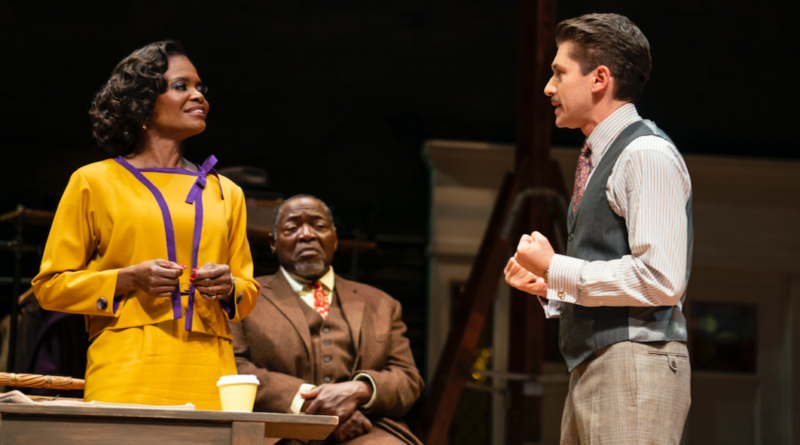REVIEW: ‘Trouble in Mind’ turns necessary mirror on theatrical industry
Photo: From left, LaChanze, Chuck Cooper and Michael Zegen star in Alice Childress’ Trouble in Mind, now playing on Broadway. Photo courtesy of Joan Marcus / Provided by Polk & Co. with permission.
NEW YORK — Alice Childress’ Trouble in Mind, now receiving an exquisite production at Roundabout Theatre Company’s American Airlines Theatre, was originally produced off-Broadway more than six decades ago, and its transfer to Broadway was canceled when the playwright would not “soften” the show’s themes of racism in the theater world. Childress, to her immense credit, would not abide by the suggested changes, and Trouble in Mind never received the Broadway run it so richly deserved. Roundabout has thankfully addressed this unfortunate historical episode and given the powerful play its long-delayed, but extremely necessary Broadway debut.
In the show, LaChanze plays Wiletta Mayer, an actor entering rehearsals for a new play on Broadway. Joining Wiletta in the cast are colleagues and acquaintances from the New York theater world, actors of color who have built a career in the 1950s, often performing in roles for white directors and white playwrights. Michael Zegen plays Al Manners, the difficult and demanding director, a white man who believes he’s giving the Black cast a chance to create meaningful art, but he ultimately abides by the systemic racism at play in the production and the overall theater industry.
Throughout the play, Wiletta is faced with many choices. She can follow the lead of her colleagues on stage and be thankful for the gainful employment, a position held by Chuck Cooper’s Sheldon Forrester, who shares his thoughts and anecdotes of overcoming adversity in the unfair world of show business. Or, she can make a stand and change the plot of the play she’s been asked to perform, augmenting its storyline to be more truthful and authentic, rather than stereotypical and unfair.
Providing solid supporting work throughout the evening are Jessica Frances Dukes, Danielle Campbell, Brandon Michael Hall, Simon Jones, Alex Mickiewicz and Don Stephenson. The ultimate arc though is Wiletta’s, with her decision on what to do with the dialogue she’s been given. LaChanze is a skilled performer who constructs a believable, heartfelt performance of a woman at a crossroads, someone who understands the environment of the theater industry and the United States as a whole. This is 1957, a time when segregation and discrimination was a daily reality for the Black community in the country, and although some might think the supposedly forward-thinking theater industry was progressive and different than the rest of society, the truth was a different matter. Show business back then, and in many ways up until today, held tight to a power structure that kept groups and individuals marginalized and without a strong avenue to be heard and to be seen. Although Wiletta’s struggles are ostensibly about mid-century politics and civil rights, they can still apply to the continued obstacles faced by people of color today, both in and out of the theater industry.
Childress’ words are both prophetic and damning. As the recent social movements in the United States have proved, there is much work to be done in all sectors of society as it relates to diversity, equity and inclusion. Wiletta, faced with an unfair proposition, is asked to take baby steps toward real, transformative change, but why should she wait any longer? She has been waiting a lifetime for respect and integrity to be part of the theatrical process, and her request should already be a given: authenticity when telling stories that are purportedly based on real life. She wants to be truthful, to her audience and to herself.
The cast is uniformly excellent. There’s no one better than LaChanze when considering an actor who can hold a crowd of 1,000 people in rapt attention to her every word of dialogue. There’s also a second-act scene involving Cooper’s character that is heartbreaking and tellingly powerful. He recounts a story from his character’s childhood when he witnessed a lynching. He shares the sad, sad tale, and Charles Randolph-Wright’s direction and Kathy A. Perkins’ lighting design frames his monologue at the center of the stage in such a poignant, subtle manner that everyone collectively leans forward in concern, anguish and empathy. It’s a powerful moment of theater, perhaps the most powerful moment playing out on any stage in New York at this moment.
Trouble in Mind deserved to play Broadway 60-plus years ago. Unfortunately that did not become a reality for Childress, but thanks to Roundabout, a stellar director and an equally stellar cast, the play is receiving its time in the spotlight, simultaneously holding up a mirror to the theater industry that once rejected these words and is now trying to embrace them and learn from them. Let’s hope that real transformation occurs.
By John Soltes / Publisher / John@HollywoodSoapbox.com
Trouble in Mind by Alice Childress. Directed by Charles Randolph-Wright. Starring LaChanze, Michael Zegen, Danielle Campbell, Jessica Frances Dukes, Brandon Michael Hall, Simon Jones, Alex Mickiewicz, Don Stephenson and Chuck Cooper. Running time: 2 hours, 15 minutes with one intermission. Now playing at the American Airlines Theatre in a production from the Roundabout Theatre Company. Click here for more information and tickets.

